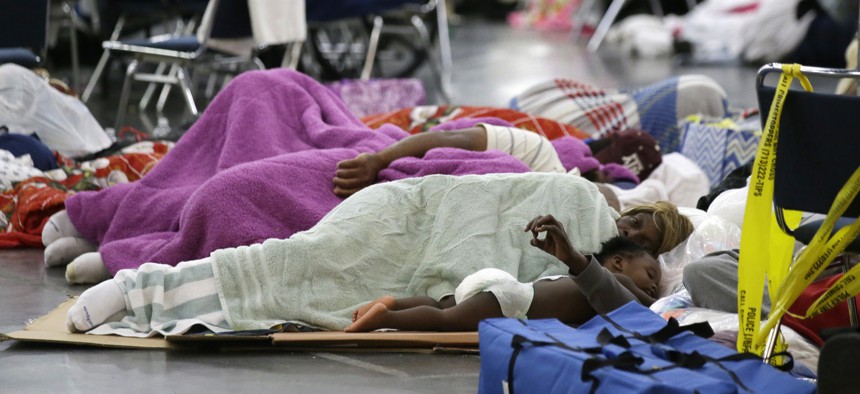The Invisible Toll of Trauma and Stress From Storms Like Harvey

People sleep on the floor at the George R. Brown Convention Center that has been set up as a shelter for evacuees escaping the floodwaters from Tropical Storm Harvey in Houston, Texas, Tuesday, Aug. 29, 2017. LM Otero / AP Photo
Connecting state and local government leaders
Research on Hurricane Katrina survivors shows that the mental health impact of a catastrophe of this scale will likely linger for years to come.
There’s no doubt about it. Natural disasters like Harvey are massive threats to public health.
The immediate wake of the storm has left hundreds of thousands of people without access to their normal health care routines. Dialysis appointments can’t be reached, cancer treatments are on standby, basic tasks like refilling prescriptions become herculean challenges.
Likewise, the public health infrastructure has taken a major hit. MD Anderson, Houston’s foremost cancer hospital, was rendered completely unreachable by flooding and photos posted to Twitter show storm water seeping into the facility’s waiting room.
Recovery from a catastrophe of this scale will take place over a span of years, not days. But in that time period perhaps the longest-lasting health impact of the storm will also be the hardest to see—the effect of trauma on survivors’ mental health and wellness.
In this area, Hurricane Katrina offers up some valuable lessons.
Learning From Katrina
One year post-Katrina, the Kaiser Family Foundation began a long-term project to survey residents of New Orleans who had experienced the storm and the levee breaches that followed. The researchers spoke with 1,504 randomly selected people, many of whom were contacted the old-fashioned way, by going house-to-house.
The data from their responses are perhaps the most persuasive argument one can make on behalf of the need for attention and resources to be paid to behavioral health needs in the wake of events like this.
In the first survey, carried out in 2006, one out of six respondents reported that their mental health had declined since the storm. And, as many as 23 percent of those that answered said that the residual stress of the storm had affected their behaviors in ways that could endanger their relationships.
Seventeen percent of respondents said they found it harder to control their tempers—that number rose to 23 percent if just people from Orleans Parish are counted—and 14 percent said the storm played a role in adding stress to their marriage or relationship.
This was just the beginning for the foundation’s survey project—researchers went on to conduct interviews in 2008, 2010 and 2015. That data shows a stark reality: that the emotional and mental aftermath of the storm takes years to abate.
Three years post-Katrina, in 2008, the majority (53 percent) of those who had lived through the storm reported that their “general level of stress” was worse since the storm. Four in 10 described their mental and emotional health as having deteriorated in that same period. This impact wasn’t just felt in adults. One quarter of the parents who were interviewed for the survey said their children’s emotional and mental health had been affected by the disaster.
Even 10 years after the storm, many of these emotional scars still remained. The 10-year survey found that 21 percent of the respondents attributed their difficulty sleeping to the trauma from Katrina and 12 percent were still finding it difficult to keep their tempers in check.
Reporting from National Public Radio that was carried out in tandem with the 10-year survey showed that for many the grief and emotional pain of the storm hadn’t gone away. One woman interviewed for the project, Ermence Parent, said she has suffered from depression related to that grief ever since her Katrina experience.
"The problem with mental health issues is they don't go away," she told NPR in 2015. "You can try to bury them if you like, but they only get worse."
The mental health challenges appear to have been even greater for the survivors of Katrina who remained displaced years after the storm. A separate 2007 survey of those still living in Federal Emergency Management Agency trailer parks in Mississippi found that 70 percent of individuals experienced symptoms of depression and 25 percent reported suicidal thoughts.
Mobilizing a Mental Health Response
Mental health care in the wake of a traumatic event has been the focus of Dr. Benjamin Keyes’ career. Keyes is an associate director for trauma and resiliency studies at Divine Mercy University in Arlington, Virginia. His organization, the Green Cross Academy of Traumatology, was founded in 1995 to help survivors of the Oklahoma City bombing. Since then, its mission has been to deploy trained trauma counselors to sites where their services are needed.
The Green Cross is currently on standby awaiting a direct request to bring their trauma counselors to Houston.
“We do not go in unless we’re invited. Otherwise we’re just in the way,” Keyes said in an interview with Route Fifty. “You really need to be a part of the incident command system that’s going on down there.”

The Green Cross has deployed to the sites of natural disasters in the past. Counselors from the group were called in by local officials following the deadly 2014 landslide near Oso, Washington and they worked closely with the fire department in Toms River, New Jersey during recovery from Hurricane Sandy. The group was also called in to bring mental health assistance to New Orleans and Mississippi following Katrina.
For state and local government agencies in Texas, the work is just beginning. Houston and the surrounding areas are still in rescue mode. Keyes said there are already steps they can be taking to keep mental health a priority. For cities, he says, it's most important right now to focus on first responders. Resources to keep them focused, healthy, and free of what Keyes called “compassion fatigue” will be crucial in the coming days.
In Keyes’ experience, the need for extra mental health support for survivors starts at about three weeks after the disaster.
There are some people who will be able to pick themselves up and keep going, said Keyes. But there will also a certain segment of the population that is going to need mental health intervention. And, according to Keyes, the number of those people in Houston is “going to be staggering.”
And for those people, the Green Cross stays for as long as necessary. They had teams in New Orleans consistently for over a year. “We go until they don’t need us anymore,” Keyes said.
In thinking about his experience with Katrina, Keyes thinks in particular about the survivors of that storm who were relocated from New Orleans to Houston. Those people have now experienced this type of catastrophe twice.
That realization is also not far from the mind of Diane Rowland, the executive vice president of the Kaiser Family Foundation, who spoke with Route Fifty about the organization’s Katrina survey.
“The people who are being evacuated from these houses are traumatized,” Rowland said. “And they’re going to come back having lost everything.”
And, she added, “Some of these people in Houston are the people who lost everything in Louisiana.”
Quinn Libson is a Staff Correspondent for Government Executive’s Route Fifty based in Washington, D.C.

NEXT STORY: OPM CIO heads to Michigan



